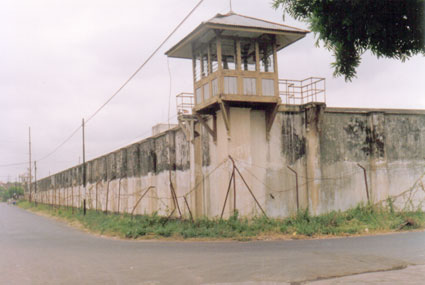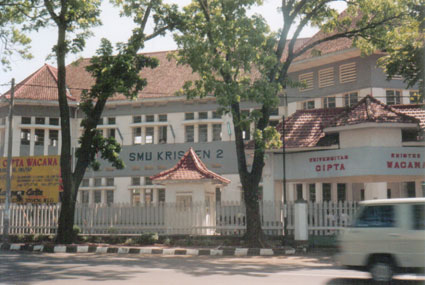The Kempeitai
My mother told me that Mrs. Sloekers and her son Jan had to leave the plantation and they were now just like us, in an internment camp, I can’t remember in which camp they were, but they were not in Malang.
Mrs. Sloekers wrote my mother that Cora was back with her parents and that Japanese soldiers had taken our little dogs, Molly and Dolly, with them. I was happy for Cora but I felt very sad about the little dogs, now we could never find them back again when we could go back home to Sumber Sewu.
One bad afternoon I went with four boys and a girl to one of the three forbidden houses in the Welirang street, I have forgotten the numbers, but those three houses were behind the Kempeitai building, once a Christian high school, in the Semeru street. The Kempeitai was of course outside our camp, there was quite some barbed wire between the Semeru street and the Welirang street. The three houses behind the Kempeitai were empty, and the doors were locked, so the six of us crawled to the back garden. Luckily there were trees and shrubs so we could hide ourselves behind them. We couldn’t see much, but what we heard was more than enough. I was really scared when I heard people, men and women, screaming in death agony.
We understood that many people were tortured by the Kempeitai, this was terrifying, people suffering in pain, they couldn’t stop screaming. We quickly went back to our street, we were all six of us between fifteen and seventeen years old, and we were deeply shocked by what we had just heard, we decided not to talk to anyone about our ugly adventure. I never told my mother a word about the Kempeitai building in the Semeru street.
More people were coming into our camp De Wijk, but at the same time a few others were transported to some unknown camps somewhere in Java. The sphere in our camp began to change a little, because quite some people had no money left to buy something extra for their children.
The Indonesian milkman was no longer allowed to enter our camp, so there was no more milk and butter.
Especially my mother found this camp life very difficult. Mrs. Hoogland was a quite a selfish lady she made a problem of having to share her house and that was not easy for the others.
In November 1943, my mother had a visitor, he came by bicycle from the “ Marine camp” where my father stayed. He told my mother that he was bringing her bad news. My two younger sisters and I were asked to leave the room.
When we were allowed to come back again we found my mother crying and it took a very long time before she could stop. Some of the other ladies in the house tried to comfort her and helped her as much as they could.
The visitor was sent by the military from the Marine camp to tell my mother that my father had been taken to the Kempeitai. It seemed that my father had hided weapons and ammunition at Sumber Sewu. My mother had to sign several papers mentioning that she didn’t know anything about weapons at all, so that she could stay in the camp.
We were all four very upset, this was a real nightmare. Because I had visited one of the three forbidden empty houses in the Welirang street, I fully understood what was now happening to
my father, yes this was a nightmare.
Would my father have to stay in the Kempeitai prison Lowok Waru? Were we ever going back to Sumber Sewu?
Sadly enough there were many true rumours about how the Kempeitai treated their prisoners.
Not only Dutch and other Europeans were tortured, but also many Chinese and Indonesians.
Getting in the hands of the Kempeitai, was a hell on earth. My own father was now one of their prisoners. I felt very lost.
After the war we learnt that my father’s Japanese barber, Mr. Matayoshi, was not only a barber but he had also been a secret Japanese colonel as well. Mr. Matayoshi became the interpreter from the Kempeitai in Malang. So he must have met my father in November 1943 at the Kempeitai office.
What did Mr. Matayoshi feel when he looked into my father’s eyes?


The Kempeitai Lowok Waru prison from Malang
M.S. Sibajak


